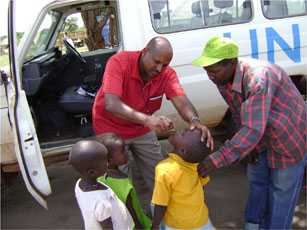STOP: Requirements and Considerations
Technical Qualifications
CDC is seeking highly qualified public health professionals to join the STOP Program for 5 ½ month assignments, for a maximum of two years. Please click on the links below to find out more about the specific qualifications for each STOP position.
- Field Epidemiologist Position Requirements
- Data Manager Position Requirements
- Immunization and Surveillance Data Specialist Position Requirements
- Communications Specialist Position Requirements
Fluency in English or French is required. Fluency in a second language, such as Spanish or Arabic, is desired. Prior experience working or studying internationally is highly desired, but not required to apply.
Cross-Cultural Qualifications
It is essential that STOP participants be able to work well with others of different cultural and religious backgrounds. STOP participants must also possess strong communications skills, work ethic and organization, in addition to patience, flexibility and resilience.
Training and Orientation
Prior to deployment to the field, STOP participants receive 2-3 weeks of training conducted by CDC, in conjunction with WHO and UNICEF staff. The purpose of this training is to provide participants with an overview of their assignment and their roles and responsibilities in the field. Topics covered include polio endgame strategies, best practices for routine immunization and disease surveillance activities, as well as specific measles, communications and program administration information.
Training for STOP 50 will be held in Atlanta, Georgia.
In addition, upon arrival in country, STOP participants will receive an in-country orientation from the WHO and/or UNICEF Country Office to orient them on the administrative and security procedures in their country of assignment.
Living and Working Conditions
STOP assignments are intended for public health professions with extensive experience working at the district and regional levels of the health system and who are able to work with very little support and supervision.
STOP participants are deployed to countries most in need of assistance with immunization and surveillance programs, which can include countries with poor infrastructure, difficult living conditions and sometimes sensitive political and cultural situations. While the safety of our STOP participants is of the utmost importance, often STOP participants live in difficult conditions alongside their in-county colleagues and the communities they serve. Some challenges may include lack of adequate electricity and water, rugged traveling conditions, limited medical facilities, and limited communication.
As STOP participants are frequently sent to challenging environments with very demanding living and working conditions, family members are not permitted to accompany STOP participants to their country of assignment. In addition, family members are not permitted to accompany STOP participants to training. Applicants should also be aware that communications in the field can be very limited, as many areas may have little or no telephone or Internet access. Applicants should seriously consider their personal/familial situation or any other extenuating circumstances before applying.
STOP participants must be in excellent physical condition. STOP encourages participants who will need close medical supervision and access to medical facilities to postpone applying for a STOP assignment until they are in better health.
Compensation
The STOP program is a volunteer program – STOP participants are not paid a salary. Through the support from GPEI, participants are provided with airline tickets and a daily per diem to cover lodging, food, and authorized miscellaneous expenses.
Country of Assignment and Contracts
STOP participants do not choose their countries of assignment, and placement in a preferred country is not guaranteed. Although participants are recruited and trained primarily by the CDC, STOP participants are under the supervision of either WHO or UNICEF once deployed to the field. Therefore, STOP participants are deployed under short-term WHO contracts
No STOP participant is guaranteed a position in the field, and the STOP Program reserves the right to withdraw your acceptance to the team or terminate your contract at any time (during training or while on assignment).
To be eligible for deployment to the field after being accepted to a STOP Team, participants must first obtain a US visa, country and medical clearance, as well as successfully participate in STOP Training. A supervisor evaluation is necessary at the end of each assignment and will help determine whether you are eligible for future deployments.
- Page last reviewed: November 28, 2016
- Page last updated: November 28, 2016
- Content source:
Global Health
Notice: Linking to a non-federal site does not constitute an endorsement by HHS, CDC or any of its employees of the sponsors or the information and products presented on the site.



 ShareCompartir
ShareCompartir